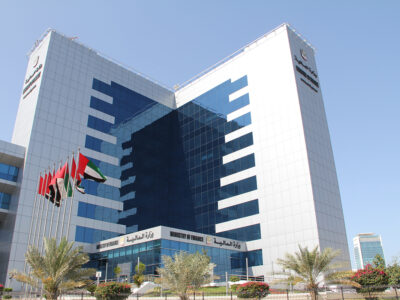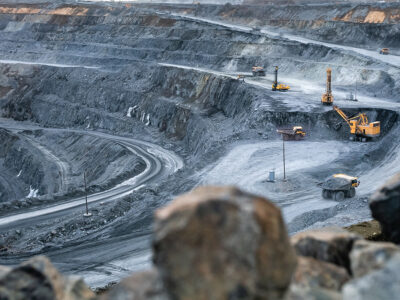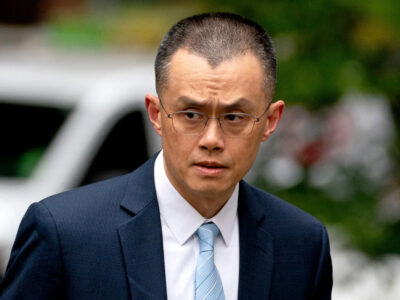“There are two kinds of people in this world,” insists Arif Naqvi, breaking into a broad grin. “The first kind wake up in the morning, they look up, and they say ‘Good morning, God’. The second kind wake up in the morning, look up, and say ‘Good God, it’s morning’.”
Without a doubt, the CEO and vice chairman of private equity giant Abraaj Capital belongs to the former category. He is a self-confessed “massive optimist” – and with good reason, as his company is at the forefront of the region’s increased confidence in the private equity market.
Increased liquidity is attracting some of the biggest names in the field to the Middle East, and Abraaj has taken swift advantage of the shift in industry attitudes, rustling up a series of funds in sectors as diverse as aviation, infrastructure, and agriculture. Last week, Abraaj closed the largest private equity acquisition in the history of the Middle East and North Africa, with the US$1.41bn leveraged buyout acquisition of Egyptian Fertilisers Company (EFC), one of Egypt’s largest private-sector fertiliser manufacturers and exporters.
“It’s the first deal we’ve done in primary petrochemicals, although we’re very comfortable in the sector, and we’ve always wanted to do a landmark transaction in the sector,” says Naqvi. “The sector’s very exciting and interesting, given how critical it is to the region.”
It is so exciting that Naqvi happily admits Abraaj is in “very advanced” talks with a number of other Egyptian companies in the same line of work.
“We’re talking to four or five other producers in the region with a view to coming together under a common platform,” he reveals. “That’s what private equity does – it pulls other businesses in to create a far bigger critical mass and scale that enhances efficiency and yields, and can get us better values when we eventually exit the business.”
For Abraaj, Naqvi explains, fertiliser means bigger business than might initially be apparent.
“Every analyst tells you that if we keep burning oil at the speed we’re using it, we’re going to run out of oil in the next 50 years,” he says. “It may take 30 years, it may take 60 years, but it doesn’t matter – there’s a finite end to that particular natural resource.
“The world’s not going to stand still,” he continues. “The world is going to be looking for alternative energy sources, it’s going to be looking at biofuels, it’s going to be looking at wind power, and so on.
“So we are going to be using alternative sources. Now what is the biggest alternative source today? That’s ethanol – and ethanol comes from corn, sugar cane, and stuff like that.
“In order to enhance the productivity of things that we grow, you need fertiliser, and that’s why the fertiliser industry has a very rosy future ahead of it.” The deal is a fine example of the foresight that has enabled Abraaj to build seven funds, worth a cool US$4bn between them, over the last decade. In addition, the firm is also the single largest shareholder in leading regional investment bank EFG-Hermes.
“With our deployable capacity – with each of our transactions we only use about 30% capital, the rest is co-investor capital and then leverage on top of that – we’re talking about deploying close to US$12bn in the region over the course of the next few years,” reveals Naqvi.
“Last year, for example, we invested over US$1bn, and this year we expect to achieve double that.
“We’re on a very rapid acceleration process in terms of investment, which is coming at a time when stock markets are going through corrections and are significantly off highs, so that means that we have great buying opportunities at this time,” he continues. “We’re long-term investors, we’re stable investors, we look at opportunity not just for today, but for the next few years to come. Our exit drivers are not time, but efficiency.”
With utmost efficiency, Naqvi rattles through Abraaj’s key business lines. Each has proven hugely successful in its own right; each has made its investors rich.
“There’s real estate, where we have one fund fully invested and exceptional returns produced for our investors. We’ll probably be raising another real estate fund some time this year,” he says.
“We have the special opportunities business, again fully invested, where we take minority positions in public companies. It’s almost like a hedge fund, but we’ve outperformed every other regional fund in the stock market last year, and this year so far,” continues Naqvi, matter-of-factly.
“Everybody else is in the negative realm because of the markets; we’re very positive on the returns from that business.
“Our third area is the equity buyout space where we have two operational funds, again fully invested. We’re into about 14 or 15 companies in that space that we’ve invested in,” he adds.
The final area is that of infrastructure. Last year, Abraaj launched its first infrastructure fund with Deutsche Bank and Ithmaar Bank, and saw a first closure at US$500m in December. The next close will be at the end of June, Naqvi adds, and the fund should be fully capital-raised by the end of October. “Where’s the biggest investment thrust in this part of the world going to come from?” he asks, leaving barely a breath before the answer. “It’s going to be in infrastructure, because as governments are accumulating these surpluses they’re also realising that they need to spend them very intelligently, because they’re generating wealth off a dwindling resource. It’s not going to come again and again.
“We’ve experienced a boom in the last three or four years, but what does that boom mean? It has been driven primarily and totally by the private sector – real estate, stock markets, and so on,” he continues. “As that has slowed down, governments have kicked in. And who’s going to benefit from that? Again, it will be the private sector because they are the subcontractors to that process.
“So I see good years ahead of us, but the one sea change that I see is that governments are now beginning to realise that all of this infrastructure spend needs to be through the private/public partnership model,” he adds. “Governments are beginning to realise that governments should be in the business of governance, and not in the business of management.”
Naqvi’s concept of infrastructure, perhaps, is broader than the Western stereotype of roads, railways and power lines.
“The definition of infrastructure is that amount of investment that takes a country or a region to its next level of development,” he explains. “In our case, in order to get to the next level of investment, we need to be aggressively investing in education, in healthcare, and in water, as well as those other industries.”
It may not be long before Abraaj makes its mark in the region’s healthcare market, either. The company is in “exclusive discussions” to buy Turkish hospital operator Acibadem Health Services, which is currently listed on Turkey’s stock exchange with capital of US$800m, and operates hospitals and clinics in more than 20 locations in Turkey.
“You can’t solve the problems of education and healthcare by just pouring money into it,” Naqvi insists.
“You have to apply sensible science and high-quality service providers, and that’s the kind of thing we’re actively doing at Abraaj Capital.
“We’re looking at industries such as healthcare, such as water, such as education, such as petrochemicals, and such as airport infrastructure,” he continues.
“Very few people realise that Air Arabia is not just a low-cost carrier, but essentially it carries the infrastructure of the whole of Sharjah airport, within its operations.”
Abraaj’s acquisition of an undisclosed strategic stake in Air Arabia was seen as a strong show of support for the fledgling carrier. It was specifically targeted at the airline’s expansion plans, as well as to provide capital for redevelopment work at Sharjah Airport, which received more than three million passengers last year.
“The local sector is the most exciting sector for aviation in the region,” asserts Naqvi. “A low-cost carrier that is totally focused on bringing people into the region and taking them out, and is acting as a clearing-house for the 25-odd million people that live and work in this region, is going to be extremely attractive for many years to come.
“We also have an investment in a low-cost carrier in Saudi Arabia,” he continues. “We have the second aviation licence through a company called Nas Air, and that’s an extremely exciting development because Saudi Arabia, under the terms of its open-sky policy, just recently gave licences to two other players. Saudi Arabia is a massive country, and it’s under-served aviation-wise by its competition.”
Not that competition is something that Naqvi fears, at least within the private equity industry.
“The competition is here – they’re just not finding the deals that we do,” he insists. “One of our biggest strengths is our deal-sourcing capability.
“We have 20 or 22 people in our senior management that have been in this region for 15 or 20 years. They have extremely strong relationships within their local communities.
“We source deals where others don’t see them – that’s our strength,” he continues. “With EFC, for example, we sourced that deal, and then at the last minute EFC received other offers from global private equity firms. But we were so far ahead of the game by that point that it didn’t make sense for them to look at any alternatives.
Rather than being cowed by competition, Naqvi welcomes it as a positive influence on an industry that is regarded with a certain suspicion in some other corners of the globe.
“The more [competitors] that come in, the more the entire industry is going to work towards a more transparent way of doing business,” he says.
“All over the world today we’re hearing that the private equity industry is a bit of a black box, and needs to be more regulated,” continues Naqvi. “People that are operating in Europe – Apax, Carlisle, Blackstone, and others – are having a major problem right now just getting regulators off their back, and getting governments off their back, who are saying ‘we want to tax this industry, we want to know more about this industry, we want to know how you operate’.” Abraaj, as might be expected, is well ahead of the game in that respect too.
“We’re one of very few private equity firms in the world that is regulated by a central licensing authority,” says Naqvi, referring to the company’s Dubai International Financial Centre (DIFC) listing.
“We took the voluntary step well before anyone else did, and we said ‘you evolve a set of rules that are world class in nature that will enable us to be regulated’, and they did so,” he continues. “In my view, it’s the direction the entire global industry is going in, so we might as well start like that.”
The entire Abraaj story has been one of blazing a trail. According to recent statistics from the Gulf Venture Capital Association, the private equity sector in the region doubled in 2006 to almost US$18bn.
The Middle East firmly on the way to becoming the next significant private equity market, and Abraaj Capital is leading the pack.
“We know our industry, we know our region, and we’re going to define the way we operate in a culturally sensitive manner to our region,” explains Naqvi.
“Our model, when people write about it in ten years time, is going to be a hybrid model that is evolving out of this region, and serving the needs of the region,” he continues.
“That’s all we want to be. We don’t want to go out and be global players that compete in Europe and North America, we just want to do our business in our part of the world.”
It is soon time for me to plan my own exit strategy. Naqvi is expecting Mohammed Alabbar, chairman of property behemoth Emaar, and “a close friend”. He does, though, end the interview on the same positive note that it began.
“We’ve literally put private equity on the map in the region,” he smiles confidently.
“Businesses are maturing, the region is maturing, we’re in a little bit of political turmoil – and yet at the same time we’re going through the most remarkable boom in terms of economic growth that the region has ever experienced.
“So against a backdrop of enormous liquidity, very competent leadership, and some political turmoil, the business environment is more exciting than it’s ever been. Don’t you think?”
Infrastructure: the $33bn opportunity
As the Middle East becomes the largest source of infrastructure-related project finance in the world – accounting for US$33bn – Abraaj Capital believes it is crucial to have an immediate need for extensive infrastructure investment across a large range of sectors in the region.
The business is currently in the process of raising a US$2bn private equity infrastructure fund in the MENASA region, the largest fund ever raised in this area. The fund will have a target internal rate of return of 20% on invested capital contributions and a lifespan of 10 years. The fund’s focus will be to take stakes in green field projects, growth capital investments and to participate in large-scale privatisations and buyouts across all infrastructure sectors. Abraaj also expects investment requirements to exceed US$1 trillion over the next 10 years, which cannot be covered by governments alone.
According to recent studies conducted at Abraaj Capital, the South Asia region is currently suffering from under-investment in infrastructure even though India and Pakistan have emerged as the two fastest growing economies in Asia. The region is also hampered by an infrastructure that is inadequate to sustain the fast developing regional economies, which are characterised by young, growing and gradually more urbanised populations. Abraaj believes it is crucial to assist these countries needs more than those in the MENASA region. Investments have not paralleled the rapid economic growth visible in regions like India and Pakistan. Structural constraints are becoming evident and certain sectors need to be developed including education and healthcare, particularly as the region possesses some of the highest population growth rates in the world, as well as an expanding middle class demanding better products and services.
Research conducted by Abraaj has identified a number of key sectors that have significant importance to the economic growth of the MENASA region and in parallel require substantial investment. Infrastructure projects consist of three segments: Traditional infrastructure, which includes transport, port and power and utilities; social infrastructure, which deals with education and healthcare and industrial; which encompass manufacturing, mining, oil and petrochemicals.
Infrastructure projects are also a good opportunity for Middle Eastern governments to diversify their economies away from the usual oil and gas plants sectors.
– Katia Al Awwad
Abraaj Capital: current funds
The Abraaj Buyout Fund L.P
Closed in 2003, the Abraaj Buyout Fund was the first of its kind in the Middle East, with a targeted capitalisation of US$116m. The fund is set to acquire controlling interests in stable, mature and well-managed businesses and create value through various operational and financial improvements, managing incentives and the use of leverage.
The fund has helped the firm source their deals from private equity investment opportunities and has driven the region’s industry into privatisation, consolidation and management buyouts.
The Abraaj Buyout Fund II L.P
Two years following the closure of the Abraaj Buyout Fund, the firm closed a new fund, the Abraaj Buyout Fund II that was set to target a capitalisation of US$500m. The fund has a geographical focus across the GCC countries, the Levant, and other countries within the MENA region and the South Asian sub-continent. It also holds an investment strategy that is similar to its fund predecessor.
The Abraaj Buyout Fund II is primarily aimed at acquiring controlling equity positions in stable, mature, profitable businesses that have strong management to support and implement growth strategies that are typical to the Abraaj business.
The Abraaj Real Estate Fund L.P
Closed in 2004, the Abraaj Real Estate Fund targeted US$100m. Its aim was to invest primarily in the Middle East and GCC markets, however it was oversubscribed due to large investor demand. It also gained a significant ownership of Arab Technical Construction Company.
The fund was expected to invest the greater part of its assets in leisure, tourism and residential related projects and a lesser part in office, retail and industrial developments and projects.
The Abraaj Special Opportunities Fund II L.P
Closed in 2005, the Abraaj Special Opportunities Fund II has a total commitments of US$128m. The fund’s investment strategy is short-term. It is currently focusing on IPOs and pre-IPO opportunities and takes strong minority positions in quoted companies. The fund’s primary geographical focus covers a vast region extending from Morocco to the Indian sub-continent. This includes North Africa, the Levant, Gulf countries and the South Asian sub-continent.
– Katia Al Awwad







